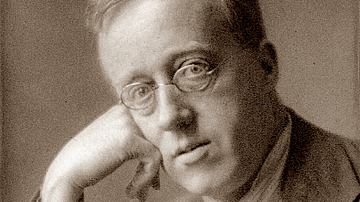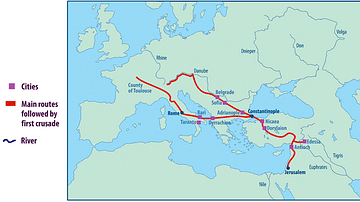Search
Search Results

Definition
Epictetus
Epictetus (l.c. 50 - c. 130 CE) was a Stoic philosopher best known for his works The Enchiridion (the handbook) and his Discourses, both foundational works in Stoic philosophy and both thought to have been written down from his teachings...

Definition
Camillus
Marcus Furius Camillus (c. 445/446-365 BCE) was the first great general of the Roman Republic to also prove himself an able administrator and honorable politician. He was chosen as dictator five times, celebrated four triumphs, and was hailed...

Definition
Philip Sidney - The Gentleman-Poet of Elizabethan England
Sir Philip Sidney (1554-1586) was an English poet, scholar, soldier, and courtier, one of the most prominent figures at the court of Queen Elizabeth I of England (r. 1558-1603). During his lifetime, he was revered as the ideal Elizabethan...

Definition
Gustav Holst
Gustav Holst (1874-1934) was a British composer of Swedish origin most famous for his dramatic orchestral suite The Planets, first performed in public in 1919. Holst also composed several operas, wrote sacred choral works such as The Hymn...

Definition
Perfection of Wisdom
Perfection of Wisdom is the foundational text of the Mahayana Buddhist school, a kind of anthology of works, thematically linked, composed between c. 50 BCE - c. 600 CE in India by Mahayana Buddhist scribes. It is comprised of 38 sutras (defined...

Definition
Eustathios Rhomaios - Judge and Jurist of the Byzantine Empire
Eustathios Rhomaios was a prominent Byzantine judge and jurist during the late-10th and early- to mid-11th century. He studied Roman Law and began his career under Basil II (reign 976 to 1025) and became the chief judge during the mid-1020s...

Definition
Wonhyo
Wonhyo (l. 617-686 CE) was a Korean Buddhist philosopher whose works impacted a wide array of later philosophers and writers through his teaching that one’s interpretation of the world created one’s reality. He is highly regarded as the greatest...

Article
Child Labour in the British Industrial Revolution
Children were widely used as labour in factories, mines, and agriculture during the British Industrial Revolution (1760-1840). Very often working the same 12-hour shifts that adults did, children as young as five years old were paid a pittance...

Image
Map of the First Crusade Routes
"This map shows the main routes taken by those who joined the First Crusade. The appeal was made by Pope Urban II in November 1095 CE but crusaders did not set out until the following summer. One route went through Hungary crossing the Byzantine...

Article
Social Change in the British Industrial Revolution
The British Industrial Revolution (1760-1840) witnessed a great number of technical innovations, such as steam-powered machines, which resulted in new working practices, which in turn brought many social changes. More women and children worked...